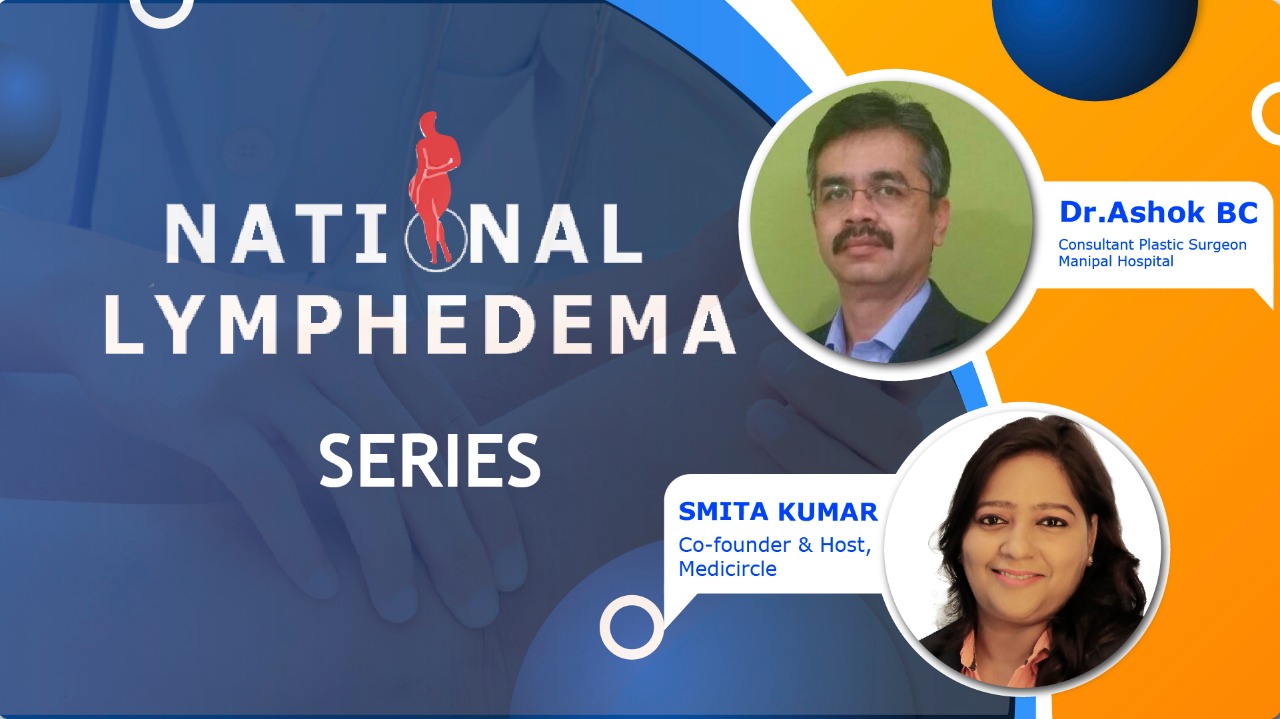Lymphedema refers to swelling that generally occurs in the arms or legs caused by a blockage in the lymphatic system. Despite recent medical advancements that address lymphedema, knowledge about this condition is still lacking among the general population. World Lymphedema Day is a patient-driven initiative to make the cure for lymphedema and lymph-related illnesses a global health priority. Medicircle is conducting an exclusive lymphedema awareness series featuring eminent vascular surgeons, physiotherapists, and plastic surgeons, treating lymphedema to help raise awareness.
Dr. Ashok B C is a Consultant, Plastic Surgeon at Manipal Hospital, Bangalore. He has vast experience of working in the field of plastic reconstructive and cosmetic surgery for the last 24 years. He is also an Adjunct Professor of plastic surgery and Co-Director of breast surgery fellowship at Manipal University. He has achieved a fellowship in hand and microsurgery as well as super microsurgery and lymphatic surgery from Japan.
Manipal Hospitals is one of the top multi-specialty hospitals in India located in all major cities like Bangalore, Vijayawada, Visakhapatnam, Goa, Salem, Jaipur, Mangalore. It provides world-class 24/7 Emergency services. Its surgeons are experts in offering the best treatment for Heart, Brain, Cancer, Eye, Kidney, Joint & all major surgeries.
Hereditary Tendency of Lymphedema
Dr. Ashok, informs, “There is a group called hereditary or congenital lymphedema, which are transmitted from one generation to another, it may be the autosomal dominant variety or it can be sex-linked. So, in certain kinds of gene expression, there is a hereditary tendency for lymphedema to develop and these lymphedemas occur very early in life, somewhere around 25 to 35 years.
Lymphedema Cannot be Completely Cured but We Can Prevent It
Dr. Ashok says, “We can prevent lymphedema in certain cases. For example, if a person is undergoing axillary node dissection after breast cancer surgery, we can prevent lymphedema from occurring by either doing something called a sentinel node biopsy or we can do something called a primary lymphovenous anastomosis where after removing the lymph nodes, we can reconnect these lymphatic vessels to the available blood vessels in the axilla. These are shown to reduce the incidence of lymphedema drastically in most of the women who undergo this procedure. However, lymphedema cannot be completely cured.”
Role of Surgery in Lymphedema
Dr. Ashok mentions, “till very recently, there was no surgical intervention except removing the whole tissue and skin grafting which used to be a horrible surgery. But in the last 6-7 years, there are lots of other options which have been developed and fortunately available in the Indian medical field as well. So, through sentinel node biopsy or primary lymphovenous anastomosis, we can prevent lymphedema from occurring before it gets into the patient.
In the second set of surgeries, there are two surgical options.:
The first option is vascularized lymph node transfer. The most common cause of lymphedema other than filariasis in India results from posts cancer surgery because the lymph nodes are removed to prevent cancer which leads to the secondary problem of lymphedema. Now, in such patients depending upon the stage in which they are we can either do a lymphovenous anastomosis that is bypassing those blockages and connecting veins to the lymphatics so the backlog or the fluid which is accumulated will drain into the veins and will disappear. The second option is removing some part of lymph nodes from somewhere else in the body which is functioning and introduce them into the area where there is the problem. So, these lymph nodes suck in all the lymphatics and put it into the vein.”
These two surgeries have revolutionized how we look at lymphedema treatment and the quality of life of the patients has improved,” says Dr. Ashok.
Conservative Treatment Options
Dr. Ashok points out the following conservative treatment options:
1) Exercise and Massaging
2) Cold Compression and Bandaging
3) Skincare
All three are needed. Any of these alone might not be very effective, but in combination, they are really good treatment to do especially in the prevention or early-stage lymphedema,” says Dr. Ashok
Connection Between Weight Loss and Lymphedema
Dr. Ashok explains, “a lot of studies have shown that lymphedema affects people who have higher BMI and to a certain extent if you lose weight, lymphedema comes down. But some studies have shown that even when people lose weight, lymphedema doesn't reverse. So early stages of weight loss will help if the weight of the patient is not too much. But in morbid obesity, the reversal might not be complete or might not happen at all.”
Whom to Connect for treatments for lymphedema?
Dr. Ashok mentions, “Right now in Indian scenario, I think plastic surgeons are the ones who are treating lymphedema because they have a full repertoire of treatment that is available from microvascular surgery to excision and skin grafting. There is also a special kind of screening, indocyanine green fluorescence screening which points out the stage of lymphedema. Depending upon what stage they are, we can propose a treatment for the patient which is very apt for them. It's like tailor-made treatment for each patient. Also, patients should go to places where there is ICG scan facility as they are helpful in treating the patients,” Dr. Ashok says.
(Edited by Amrita Priya)

 The aim of lymphedema surgery at this point is to prevent complications, prevent further advancement of the disease and increase the quality of life of the person who is suffering from it, says Dr. Ashok B C, Plastic Surgeon, Manipal Hospital, Bangalore.
The aim of lymphedema surgery at this point is to prevent complications, prevent further advancement of the disease and increase the quality of life of the person who is suffering from it, says Dr. Ashok B C, Plastic Surgeon, Manipal Hospital, Bangalore.




















.jpeg)












